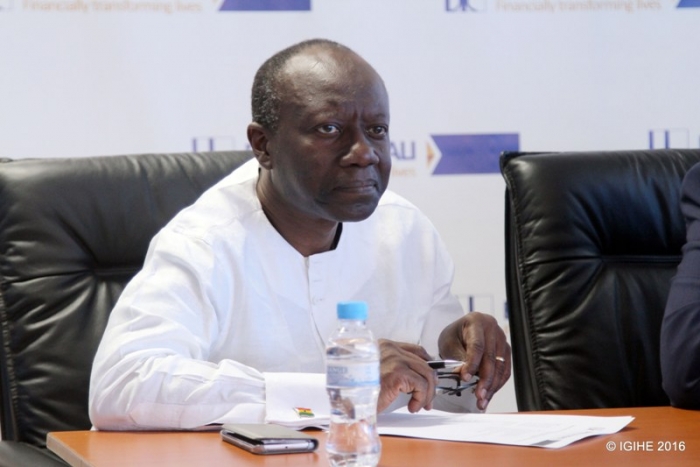Ghana’s economy to grow by 6.5% – not 7.6% – in 2019 – EIU
The Economist Intelligence Unit (EIU) has said, with consumer demand remaining robust during the year, helped by the lower cost of credit, it projects Ghana’s GDP to reach 6.5% in 2019.
This projection is about 1.1% less than the government has projected to grow the GDP this year.
The 2019 Budget presented by the Finance Minister, Ken Ofori Atta, proposes an overall real GDP growth targeted of 7.6%, higher than the 2018 expected growth of 5.4%.
In the government’s own estimation, non-oil real GDP growth for 2019 is budgeted at 6.2% as against 5.4% expected for 2018.
For end-period inflation for 2019, the government projected 8.0% which is almost the same as the targeted inflation (8.9%) for year-end 2018, while the fiscal deficit target is 4.2% of GDP, a little higher than the 2018 projection of 3.7%.
However, EIU further projects in its latest report on Ghana that GDP growth will ease to 5.7% in 2020 as “Ghana is affected by weaker global economic conditions – weighing on investment flows into the country although government and private consumption levels will rise slightly ahead of the election that year.”
Read EIU’s full projections on Ghana’s economy below.
Economic growth
Economic growth over the forecast period will be driven predominantly by the hydrocarbons sector, with a continued ramping up of oil and gas production expected. However, this oil-driven growth will mask constraints such as low productivity, infrastructure bottlenecks and relatively weak access to credit elsewhere in the economy. We expect there to be some spillover effects from hydrocarbons with increases in broader industrial production, infrastructure investment and auxiliary services – but this will be fairly limited.
In January Tullow Oil increased the production outlook for Ghana’s Jubilee and TweneboaEnyenra-Ntomme oilfields for 2019, despite the weak price outlook for the year. The company is looking to generate revenue to service debts built up from costly regional exploration and development work. Outside the oil sector, we expect lending growth to continue to recover from a slump in early 2018, which was caused by a rise in the reserve requirement.
A stronger banking sector following consolidations will also be in a position to take advantage of improved liquidity conditions following the January 2019 cut in the policy rate, which will support growth in industrial activity.
Consumer demand will remain robust during the year, helped by the lower cost of credit, but ultimately constrained by low value added in the agricultural sector which serves to limit wage growth for workers and price rises moderating consumer sentiment. Accordingly, we forecast overall GDP growth of 6.5% in 2019.
We expect growth to ease to 5.7% in 2020 as Ghana is affected by weaker global economic conditions weighing on investment flows into the country although government and private consumption levels will rise slightly ahead of the election that year. In February Aker Energy announced the discovery of 450m-550m barrels in the Deepwater Tano Cape Three Points block off the coast of Ghana, with potential recoverable reserves of nearly 1bn barrels.
The first oil from the Aker fields is expected by the first quarter of 2021. Growth is expected to average 5.9% in 202123, reflecting the development of these new oil and gas resources boosting output volumes, combined with our expectations for a recovery in global oil prices. In addition, we expect to see stronger non-oil performance as the government’s policy reform efforts to boost the private sector —such as One District, One Factory—start to bear fruit.
However, agricultural growth will continue to be hampered by unfavourable prospects for the cocoa sector, reflecting the poor underlying quality of the tree stock; some 40% of Ghana’s cocoa farms are infected with diseases (particularly swollen shoot virus) or have overaged stock, and this will temper growth in yields. Hot, dry weather at the start of the season will also weigh on cocoa output in 2019.
Inflation
We expect that annual average inflation will remain elevated in 2019, although it will moderate slightly to 9.6%, from 9.8% in 2018.
The weaker cedi combined with growth in private consumption levels is driving increases in consumer prices, notably through the rising cost of imported food items (which constitute a large share of the total food bill).
We expect the BoG to manage to keep inflation within the official target band of 6-10% during 2020-23.
However, with fiscal consolidation taking place at a relatively slow pace and domestic demand remaining robust, inflation will remain close to the upper bound of the target range, averaging 9.1% in 2020-23.



